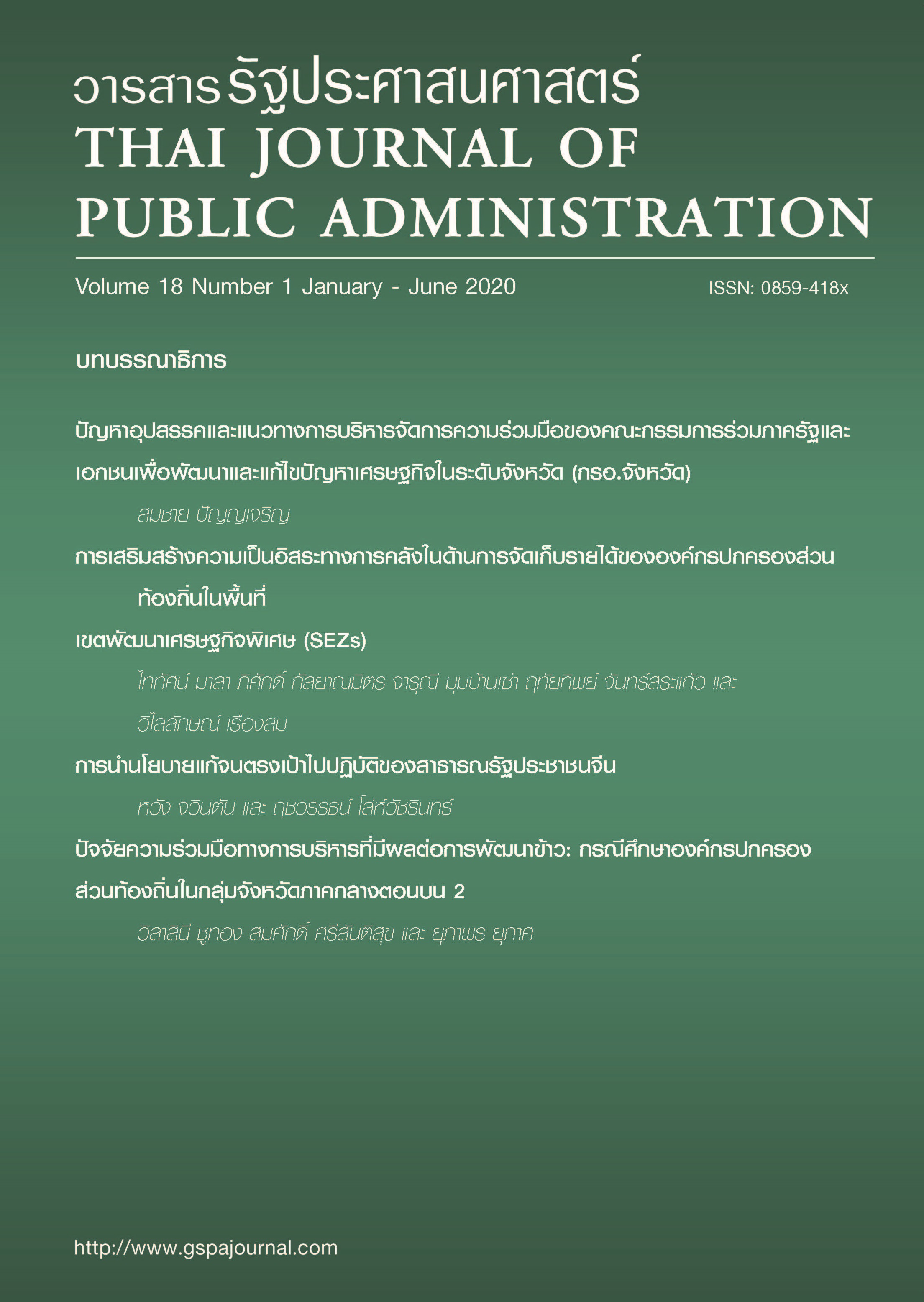Fiscal Autonomy in revenue collection of Local Administrative Organizations in Special Economic Zones (SEZs)
Keywords:
Fiscal Autonomy, Local Administrative Organization, Special Economic ZoneAbstract
This article purposes to study 1) The sources of the local administrative organization’s revenue in the Special Economic Zone (SEZs) 2) The fiscal autonomy in the revenue collection and 3) To study as well as analyze the way of the strengthening of fiscal autonomy in revenue collection of local administrative organization for the SEZs. The research uses the mixed method both qualitative and quantitative in this study. By using questionnaires distributed to 487 samples of the local administrative organizations that are included in the SEZs. The data collection by the field research documents from 5 local administrative organizations of the SEZs. The in-depth interview is used to gather information from 50 stakeholders and a focus group discussion. From this study, it revealed that the SEZs had the fiscal autonomy in revenue collection at a minimal level. The revenue autonomy index (RAI) point average was at 11.94 percent. Because of the structure of revenue still depended on the budget from government both in form of the tax that government collected and subsidy. While the proportion of the SEZs revenue collections themselves still were at a minimal level. Therefore, it may conclude that although there was an investment promotion policy from the government for the SEZs, it could not reflect to the distribution of prosperity to the region, the reduction of inequality, the improving of income, and the development of local people life quality.
References
Bröthaler, J., & Getzner, M. (2011). Fiscal Autonomy and Total Government Expenditure: An Austrian Case-study. International Advances in Economic Research, May 2011, v. 17, iss. 2, 134-56.
Chantavanich, S. (1997). Quality Methodology. Bankok: Chulalongkorn University.
Department of Foreign Trade. (2016). Guide for Investors Thailand Special Economic Development Zones. Bangkok: Department of Foreign Trade, Ministry of Foreign Trade.
Jean-Philippe, M. Vaillancourt, F. and Yilmaz, S. (2004). Decentralization or Fiscal Autonomy? What Does Really Matter? -- Effects on Growth and Public Sector Size in European Transition Countries. Policy Research Working Paper No. 3254. Washington DC: World Bank.
Office of the Nationanl Economic and Social Development Council. 2015. Direction of National Economic and Social Development Plan Issue 12. Bankok: Office of the Nationanl Economic and Social Development Council.
Panyawattanalikit, S., Srilom, L., Buranupakorn, A., Santirojanakul, S. and Jullajakwatana, J. (2016). The Study of Law on Fiscal Governance and Local Government Budgets are not Conducive to Independence. Bankok: Thailand Research Fund.
Pitaktepsombat, P. (2007). THE SAMPLE SURVEY: THEORY AND PRACTICE. Bankok: Sematham.
Shah, A. (2007). PUBLIC SECTOR GOVERNANCE AND ACCOUNTABILITY SERIES PARTICIPATORY BUDGETING. Ed. Anwar Shah. Washington, DC: World Bank.
Singkaneti, B. and Pumkaew, D. (2017). Problems of Local Public Finance in Thailand. Thai Journal of Public Administration. 15 (2), 3-23.
Sittiyot, T., Likittragolwong, T., Samrej, P., Chaidee, O. and Wansuksai, S. (2016). Measures to Promote Revenue Autonomy of Local Government: Selected Case Studies from Local Administrations Located in Special Economic Zone. Bankok: Thailand Research Fund.
Sukdanont, S., Pechdin, W., and Tawinnorppanan, P. (2018). Spatial Efficiency Enhancement of Thailand–Myanmar’s Cross–border Passes in Chiang Mai Province. NIDA Development Journal. 58 (4), 23-43.
The Board of Investment of Thailand. (2015). The handbook of Investment in Special Economic Zone. Bankok: The Board of Investment of Thailand.
World Bank. (2001). Intergovernmental Fiscal Relations. Retrieved August 12, 2016, from http://www1.worldbank.org/publicsector/decentralization/fiscal.htm.
Downloads
Published
How to Cite
Issue
Section
License

This work is licensed under a Creative Commons Attribution-NonCommercial-NoDerivatives 4.0 International License.



